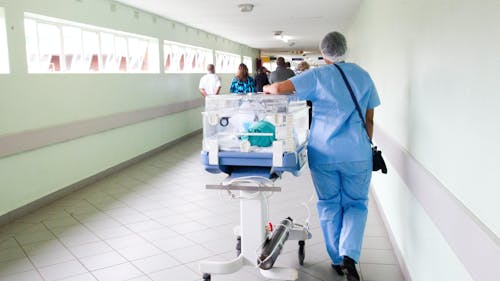School of Nursing hosts panel discussing nationwide nurse staffing crisis

On March 1, the Rutgers School of Nursing hosted a virtual seminar to discuss the various factors affecting the nationwide nurse staffing crisis, according to a social media post.
Laura Mularz, a clinical assistant professor and nursing leadership programs specialty director at the Rutgers School of Nursing, led the hour-long event, which featured panelists Katie Boston-Leary, Robyn Begley, Helene Burns and Courtney Vose.
Mularz said factors such as appropriate compensation and scheduling for nurses are issues that have been exacerbated by the pandemic and continue to worsen.
Boston-Leary, director of nursing programs of the American Nurses Association, said fostering a safe working environment for healthcare professionals, especially nurses, would benefit them mentally and physically.
While there is current legislation to protect nurses in their work environment, she said hospitals could take more direct action through initiatives like installing metal detectors in clinical settings.
"As leaders, we don't take care of patients, but we're supposed to take care of the people that take care of patients," Boston-Leary said.
She also said that communication between healthcare professionals in a hospital setting should become more positive to ensure a better work environment for nurses and doctors alike.
Begley, CEO of the American Organization for Nursing Leadership and chief nursing officer and senior vice president of the American Hospital Association, said salaries for nurses need to better reflect their work.
"Nurses, of course, want to be paid their worth," she said.
Boston-Leary said that while plenty of nurses fail to care for themselves properly in terms of eating, sleeping and exercising, they still pick up additional jobs and shifts to be financially stable. Additionally, nurses often work past their designated shift time, she said.
Burns, senior vice president and chief nursing officer at Jefferson Health New Jersey, said shorter hospital shifts could prove beneficial for healthcare professionals.
She said that hospitals implementing 4-hour shifts throughout the week would help reduce the burnout of healthcare professionals but still provides adequate support to the hospital.
In addition to shorter shifts, Burns said the introduction of virtual nursing also increased flexibility in her experience. She said nurses have been using online platforms like Zoom to connect with patients.
"We're the ones who get to choose our destiny here, and I think we have to do that all together and very wisely," Burns said.
Vose, senior vice president and chief nursing officer at Robert Wood Johnson University Hospital and Bristol-Myers Squibb Children's Hospital of RWJBarnabas Health, said that understanding the financial aspect of nursing is important to learn as early as possible.
She said leaders must allocate budgets accordingly to guarantee the same level of care for patients in a hospital for treatment as those awaiting medical attention in the emergency room.
Vose also said that while it is crucial to recognize why nurses are choosing to leave the profession, there must be a shift in regard to creating more opportunities for students to get involved before graduating.
"Recruitment matters but retention matters just as much, maybe even more," she said. "If we change our lens from one of recruitment to one of attracting, I think it will make a big difference for all of us."
For example, Vose said healthcare professionals could connect with high school and college students, offer students sites for clinical rotations and provide job opportunities for students to work in local hospitals.
Following the panel, the audience posed a series of questions. Due to the high interest in the subject matter, Mularz said there might be a subsequent webinar with the same panelists to answer additional questions.
"There is going to be a bright future out there for (nurses) if we take some of the things we've learned and apply them and hear them, that we do have a bright future in nursing," Mularz said.



